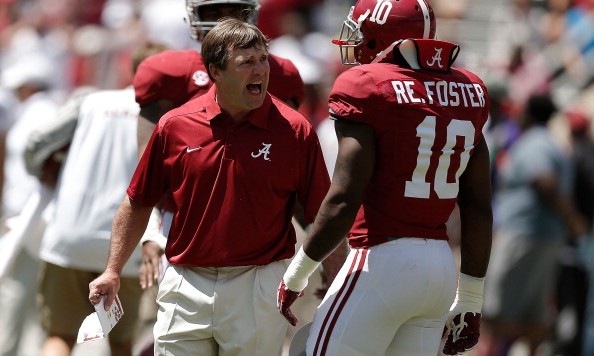How quickly things change.
Less than 48 hours later, it appears UGA has its man. According to Chip Towers of AJC.com, the school has hired Alabama defensive coordinator and former Dawg defensive back Kirby Smart to succeed Richt.
A formal announcement could come as soon as Sunday, after Alabama plays the SEC Championship Game against Florida.
*
I’ll be honest: this is a poorly thought-out hire. Sure, Smart may eventually become the next Nick Saban, Bill Belichick, or Larry Kehres (look up the name). However, he’s not what the school needs right now.
Let’s go back to the reason(s) Mark Richt was fired. Despite posting an excellent win-loss record (.739), the UGA brass was upset because Richt wasn’t beating ranked opponents and wasn’t competing for championships on a regular basis.
Bringing in Smart does nothing to fix that problem. Yes, he’s one of the finest defensive minds in college football, and has coached under some of the game’s all-time greats in Bobby Bowden and Nick Saban. However, he has absolutely zero head coaching experience. While there are plenty of examples of first-year coaches who succeed right away (like Mark Richt), it’s certainly not a given. One needs only to look at Smart’s former teammate Will Muschamp’s failure at Florida as an example of how a great defensive coach who learned from the best in business (Saban and Mack Brown in his case) doesn’t always have the makings of a great head coach.
That’s why this hiring doesn’t sit right with me. If Georgia was going to replace a head coach who won nearly 74 percent of his games, it needed to go with a proven head coach with a successful track record of winning rather than a talented coach with no head coaching experience. Sure, it’s tough to find coaches like that, but they are out there. Instead of taking a calculated gamble on a young head coach that may or may not pan out, UGA could have gone after embattled Philadelphia Eagles’ head coach Chip Kelly, whose Oregon teams were more likely to play in a BCS bowl game (four times) than lose a conference game (three times). Or, if it really wanted to hire a young coach, it could have pursued Houston’s Tom Herman, who has an excellent record of developing great quarterbacks, but also has a year of head coaching experience under his belt. With the amount of resources Georgia has at its disposal, I find it very difficult to believe that the school couldn’t have lured him away from UH. After all, he’d only been there one season.
Of course, there were also some “outside the box” options UGA could have chosen as well. Mount Union head coach Vince Kehres has led the Purple Raiders to every Division III title game since 2005 (eight years as the defensive coordinator, and two as the head coach), winning four of them. Likewise, current University of Buffalo head coach Lance Leipold guided Wisconsin-Whitewater to a 109-6 record in eight seasons, capturing six national championships in that span. If these coaches can win like that at the Division III level without the benefit of giving scholarships, imagine what they could do at a school like Georgia, which routinely brings in some of the top recruiting classes in the nation.
Whether it was a big name hire or a coach from a lower tier of college football with a reputation for winning championships, Georgia had an obligation to its fans to hire someone that it knew — not thought — could get the job done. Having someone lined up, instead of settling for what was available, also would have served the program well. Going with the “next big thing” is a risky proposition, is something that could fail spectacularly.
Just ask Nebraska.
Even though Frank Solich won more games (58) in his first six seasons than Hall of Fame coaches Bob Devaney (53) and Tom Osborne (55), Nebraska fired him because it didn’t think he could “win the big one” and that the team wasn’t competing for a national championship every season.
Sound familiar?
The school decided to go with Bill Callahan who, like Smart, was a hot commodity at the time after leading the Raiders to a Super Bowl appearance in 2002.
It didn’t work out very well. During Callahan’s four-year tenure in Lincoln, the Huskers endured two losing seasons, and went just 15-17 in conference play.
Those two poor decisions — firing Solich and hiring Callahan — still haunt Nebraska football to this day. The school has yet to win a conference championship since Solich’s dismissal and hasn’t finished any higher than 14th in the AP Poll.
Will that be the case with Smart’s hiring at Georgia?
It’s tough to say. At the risk of repeating myself, he has no head coaching experience, so we simply don’t know what to expect.
Either way, I know I’ll be writing about it the future. Bringing in Kirby Smart will either be a smashing success (like Richt) or a case of hiring the right guy at the wrong time.
It’ll be interesting to watch it all unfold.

